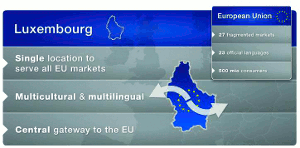Streaming Spotlight: Luxembourg’s Bid for European Data Gateway
 As its own government admits, Luxem-bourg may not be the first country that information communications and ebusiness organisations think about when establishing or consolidating a presence in Western Europe.
As its own government admits, Luxem-bourg may not be the first country that information communications and ebusiness organisations think about when establishing or consolidating a presence in Western Europe.
That said, Luxembourg has made great strides over the last 5 years in building a world-class technology infrastructure; attracting companies such as Amazon, Skype, voipGATE, Millicom International Cellular, PayPal, Rakuten (a Japanese online retailer); and eBay to base European operations there.
The country is known primarily for being tiny (just 2,586 square kilometres), having a high standard of living, and providing a services-led safe haven for many banks and financial institutions.
Arguably, there is more to it than that—certainly, that’s the message which the country’s government is keen to project. Its population of about half a million enjoys the world’s third-highest GDP per capita, and (by virtue of bordering Belgium, France, and Germany) is multilingual. High-speed cable is available to more than 90% of homes, and unemployment is low.
Like Switzerland, Luxembourg has long traded on its political neutrality and economic freedom as well as its geographic location; most major European capitals can be reached by air in an hour or less.
Both its value-added tax and effective corporate tax rate are among the lowest in Europe, and its intellectual property (IP) tax policy, instituted in 2008, offers significant tax benefits for IP created in Luxembourg or acquired by a resident company. Revenues generated from the use of licensing of software copyright, patents, or trademark may benefit from an 80% exemption, resulting in a corporate tax rate of just 6% on qualifying net IP income.
The focus has been on blue chip companies, hoping that they will attract others. “It greatly helps to have a pro-business government that is small enough to be responsive to our needs and one which understands the way the internet is transforming traditional industries,” says Brent Bellm, CEO of PayPal Europe.
The country seeks to capitalise on its reputation as a safe and stable environment by billing itself as the European gateway for information and communications technologies (ICT). This builds on the infrastructure necessary to ensure the swift, secure exchange of financial data.
“Luxembourg has a history of innovation in media,” says Tom Kettels, senior ICT advisor of the Luxembourg Ministry of State. “In the 1930s, Compagnie Luxembourgeoise de Radiodiffusion (now the pan-European media giant Radio Télévision Luxembourg [RTL]) first went to air. The first private TV stations in Europe launched here in the 1950s, and in the 1980s
we became home to world-leading satellite services company SES.”
In 1985, the government agreed on rights for the use of orbital slots for satellite transmission and awarded a commercial franchise to SES ASTRA, which maintains its European uplink hub in the country.